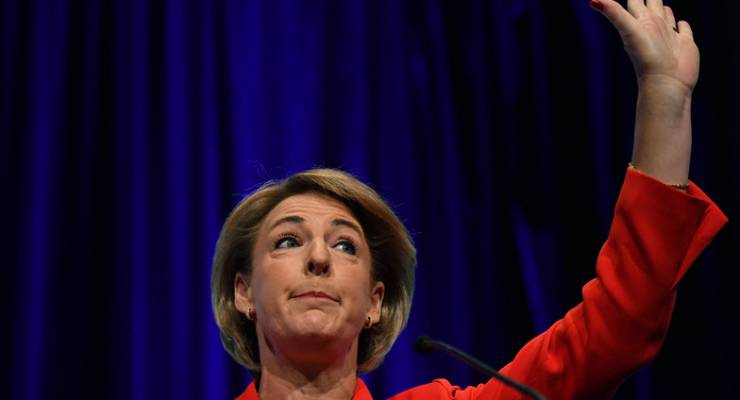
The Commonwealth Director of Public Prosecutions now faces a major test, after the Australian Federal Police referred on the actions of Michaelia Cash’s office in relation to the Australian Workers Union raids.
Last year, one or more people in Cash’s office tipped off the media about a pending AFP raid related to an investigation by the Registered Organisations Commission, initiated by the government, into the AWU’s donations to GetUp a decade ago. The ROC’s investigation is aimed at Bill Shorten, leader of the AWU when the donations were made.
[History shows the AWU raid could backfire for the Coalition]
The Abbott and Turnbull governments have repeatedly used legal and funding mechanisms to attack their opponents and critics. The AFP has been repeatedly dispatched to investigate whistleblowers who have embarrassed the government and agencies like the NBN. Two royal commissions have been established to pursue Labor figures. ABC funding has been slashed and its journalists attacked. The ROC investigation was seemingly part of this agenda, but backfired spectacularly courtesy of Michaelia Cash’s remarkable talent for stuffing up.
But Sarah McNaughton, the Director of Public Prosecutions, has also played a role. McNaughton was a counsel assisting Dyson Heydon’s trade union royal commission (TURC), and subsequently picked by George Brandis to be DPP. In May, McNaughton took the extraordinary step of prosecuting Witness K and Bernard Collaery, five years after revelations that the Australian Secret Intelligence Service broke the law and bugged the Timor-Leste cabinet. But even more remarkably, McNaughton’s summons targeted ABC journalists, editors and producers in relation to the case but omitted News Corp — despite News Corp breaking the story in 2013.
Serious questions remain about McNaughton’s conduct in relation to Collaery and Witness K: why she launched the prosecution, why the CDPP waited five years, why News Corp was omitted and ABC staff included. Plus, why the prosecution appeared to fulfil the threat made by the man who appointed her (George Brandis) against Collaery in 2013, and what interactions she had with the government in relation to the case, especially what she told Attorney-General Christian Porter about it.
The CDPP is supposed to be entirely independent of the government, but these lingering questions raise grave concerns about McNaughton’s capacity to be seen to be independent.
The Cash affair now raises those stakes. Is McNaughton content to support the government’s agenda of harassment of those who embarrass it, or is she genuinely independent? If McNaughton’s threshold for prosecution is so absurdly low as to find fault in the illegal conduct of an Australian agency being brought to light in a manner entirely consistent with the advice of the Inspector-General of Intelligence and Security — as Witness K did — then she must surely have no problem with prosecuting Cash’s staff (and, it is yet to be clarified, perhaps Cash herself).
A failure to prosecute will give substance to widespread concerns about the government’s handpicked former TURC counsel.








“A failure by the Commonwealth Director of Public Prosecutions to put Michaelia Cash’s staff on trial in relation to the AWU raids would send a grave signal about the independence of that office.”
You can change that from “would” to “will”.
There is no way that the CDPP will chase this one…..there is no independence in the APS where it comes to contrary findings relating to Coalition Governments.
Didn’t the AFP read their script? The Human Megaphone managed to piss even them off? Normally, they dovetail with the LNP, self evidently.
I agree, the CDPP *will* bury it if she can get away with it, unless it is someone else in the Megaphone’s office they are throwing under the bus to allow the Megaphone to insist she knew nothing.
It is so sad we have to think that way, but frankly it seems naive to do otherwise. So much for ‘conservatives’ holding to traditional certainties, structures and principles.
McNaughton is of course just one of a number of appointments to supposedly independent statutory government positions by this government whose independence seems very questionable. George Brandis in particular was very busy appointing ex-LNP candidates to the Administrative Appeals Tribunal.
//uatcdn.crikey.com.au/2017/07/03/liberal-connections-among-new-aat-appointments/
It seems the when Labor get back in they are going to have to do a lot of work rooting out these LNP stooges.
New Head and Deputy of Treasury.
New Head of Productivity Commission.
New Public Service Commissioner after the last Liberal Mate went after being caught passing stuff on to the IPA.
All had last jobs as Liberal staffers. Correct me if I am wrong, Bernard.
The AFP have a sordid history of saying “nothing to see here” whenever the issue of Coalition Malfeasance comes up (just look at the issue of Brough ordering Ashby to steal Slipper’s Commonwealth Diary). So if even they feel there is a case for the DPP to pursue, then it must be *really* bad for Cash’s office. Now lets just hope that the DPP isn’t so hideously compromised that it thinks dropping this case is a good idea.
I hope & pray that a future Labor government takes a very large broom to the DPP, the AFP, the Public Service Hierarchy & the ABC board.
Could not agree more. If/when they get elected the to do list will be a very long one.
This is what happens when governments make partisan appointments to public agencies. She may well be an utterly impartial and objective DPP, but she looks utterly compromised. The TURC was a stunt, a star chamber created purely to pursue the government’s political enemies, as was the ROC. Justice has to be seen to be done and in this case, there looks to be a lot of fiddling going below the surface.
What you said Mr D ***